CIVITAS DEI MEDAL
With the Civitas Dei Medal, Villanova honors Catholics who have made exemplary contributions to the Catholic intellectual tradition and the pursuit of truth, beauty and goodness.
The medal takes its name from the Latin title of St. Augustine’s City of God. In this seminal work, Augustine encouraged intellectual engagement between the Church and the world. A gifted thinker and spiritual leader, he also created communities that searched for truth in unity and love.
2025 Civitas Dei Medal Ceremony
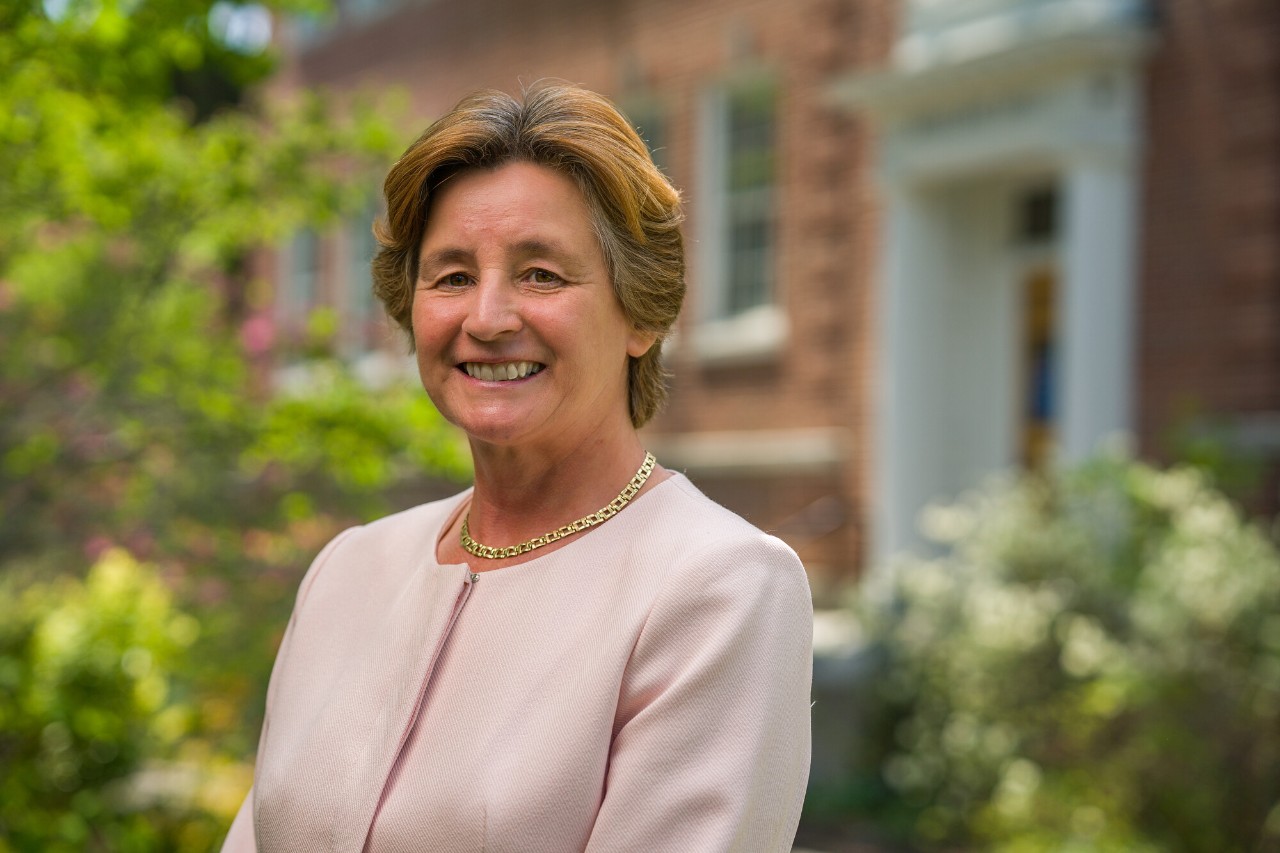
On Thursday, February 13, 2025, Villanova University will honor Michele Dillon, PhD, a prominent scholar in the sociology of religion and contemporary Catholicism, with the 2025 Civitas Dei Medal.
Dr. Dillon is Dean of the College of Liberal Arts and Professor of Sociology at the University of New Hampshire and the first social scientist to receive this prestigious honor. She will deliver the lecture, "'God is in the world': Navigating doctrinal ideas and secular realities" at the 4 p.m. medal presentation.
About Michele Dillon
Michele Dillon, PhD, is Dean of the College of Liberal Arts and Professor of Sociology at the University of New Hampshire. A leading voice in the sociology of religion and contemporary Catholicism, Dr. Dillon is the first social scientist to receive this prestigious honor.
Dr. Dillon earned her Bachelor of Social Science and Master of Social Science degrees from University College Dublin, and later completed her PhD at the University of California, Berkeley. Her research examines the relationship between religion, culture, and generational and social change, with a particular focus on identity and authority within Catholicism.
An accomplished author, Dr. Dillon has published extensively, including Postsecular Catholicism (Oxford University Press, 2018) and Catholic Identity: Balancing Reason, Faith, and Power (Cambridge University Press, 1999). Her forthcoming co-authored book, Catholicism at a Crossroads, reflects her ongoing engagement with critical issues facing the Church today. Her work has appeared in regarded academic journals and has been supported by grants from the John Templeton Foundation and other prestigious organizations.
Dr. Dillon’s accolades include serving as President of the Society for the Scientific Study of Religion and Chair of the American Sociological Association’s Section on the Sociology of Religion. In 2023, she was honored as the Michael Keenan Distinguished Lecturer at St. Thomas More College, University of Saskatchewan, and previously held the JE and Lillian Byrne Tipton Distinguished Visiting Professorship in Catholic Studies at the University of California, Santa Barbara. Dr. Dillion is also a frequent commentator on religious issues for regional, national and international media.
12th ANNUAL CIVITAS DEI AWARD
Honoree
Michele Dillon, PhD, Dean of the College of Liberal Arts and Professor of Sociology at the University of New Hampshire. Dr. Dillion is the first social scientist to receive the award.
Host
Tia Noelle Pratt, PhD Assistant Vice President and Director of Mission Engagement and Strategic Initiatives, Office for Mission and Ministry
This event is free and open to the public, but registration is required.
Note: Registration ends February 13 at 4 p.m ET. If you have not registered and want to attend the award ceremony and lecture, limited seating may be available at the event.
Parking
Attendees can park in the S-4 North Campus (Law School) parking garage on campus. Directions to Villanova University’s Charles Widger School of Law can be found here.
We invite you to watch live if you cannot join us in person using this link. Our event begins at 4 p.m.
Villanova University will be taking photographs during this event. If you attend and do not wish to have your likeness made public, you must advise the photographer at the time the picture is being taken. By consenting to have your picture taken and/or by failing to inform the photographer of your intention not to have your likeness made public, you are authorizing Villanova University to publish in any format and use for any purposes, your name and affiliation and any photographs taken of you at the event.
Thursday, February 13, 2025, 4-5:30 p.m. ET
Scarpa Hall, Goldberg Commons
Charles Widger School of Law
299 North Spring Mill Road
Villanova, PA 19085
Past Recipients
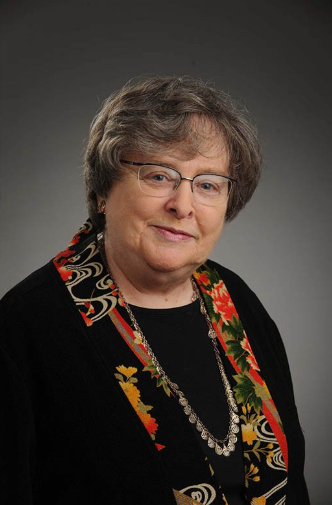
Elizabeth A. Johnson, CSJ, PhD, is a distinguished professor emerita of Theology at Fordham University and an influential voice in feminist theology and ecological ethics.
After earning her doctoral degree at the Catholic University of America, Johnson taught there for 10 years before moving to Fordham University, where she taught in both graduate and undergraduate programs. Johnson is the former president of the Catholic Theological Society of America as well as the former president of the American Theological Society. She was awarded Fordham University’s Teaching Award in 1998, the Professor of the Year Award in 2011 and has received 15 honorary doctorates, including one from Villanova University in 2005.
Johnson is deeply involved in the life of the church and has served as a theologian and consultant on numerous Catholic education boards and committees, including the U.S. Lutheran-Catholic Dialogue and the U.S. Catholic Bishops’ Committee on Women in Church and Society. Systematic theology, ecological ethics tied to creation and the ongoing dialogue between science and religion are key focal points in Johnson’s research. Her investigations are framed within the context of feminist theology, exploring their connection to the human dignity of women.
An award-winning writer, Johnson is the author of She Who Is: The Mystery of God in Feminist Theological Discourse (1992), which won the Grawemeyer Award in Religion, and Quest for the Living God: Mapping Frontiers in Theology of God (2007), among others. Her most recent book is titled Come, Have Breakfast: Meditations on God and the Earth (2024).
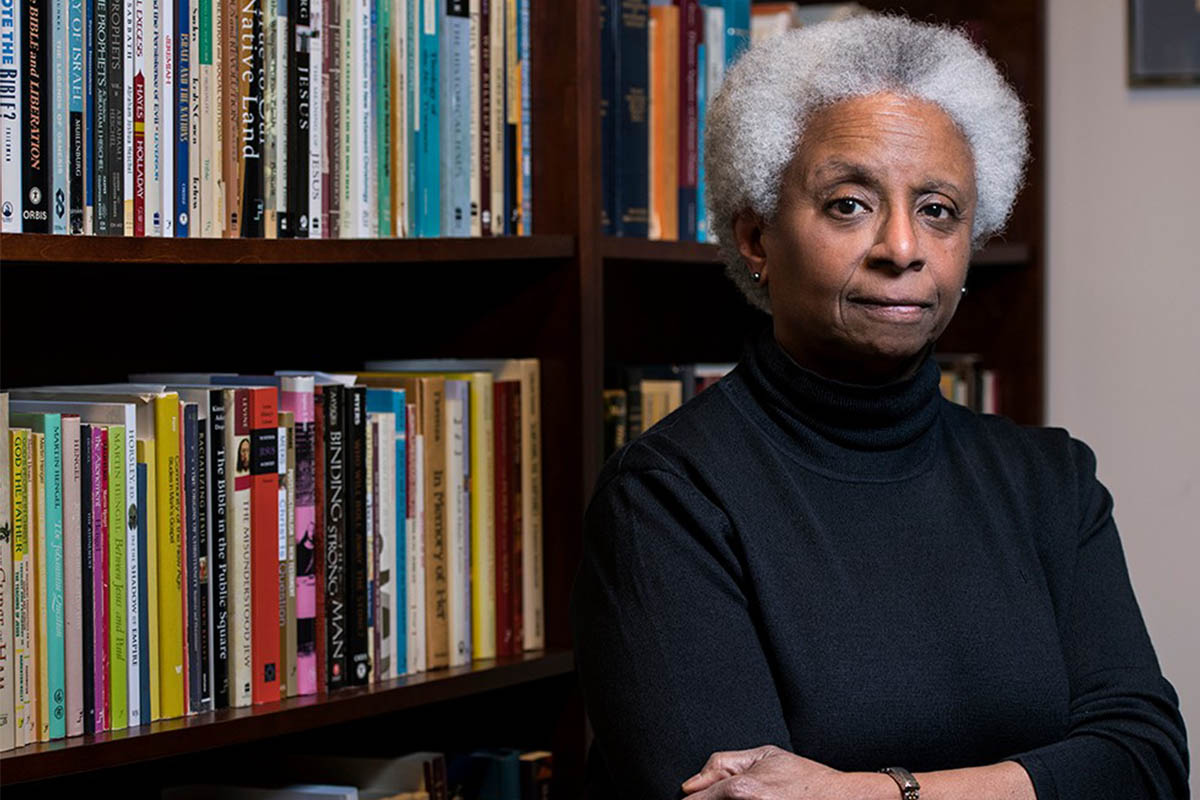
Recognized as one of the most influential voices in drawing attention to issues surrounding African American Catholics, M. Shawn Copeland is professor emerita of Systematic Theology at Boston College and, for the 2022–23 academic year, is the Vincentian Chair of Social Justice at St. John’s University (NY).
Professor Copeland, who earned her doctoral degree at Boston College, has taught theology at St. Norbert College, Yale Divinity School, Marquette University and the Institute for Black Catholic Studies at Xavier University of Louisiana. She also has held visiting positions at Harvard Divinity School and Emory University’s Candler School of Theology.
Professor Copeland has served as convener of the Black Catholic Theological Symposium and as the first African American president of the Catholic Theological Society of America. Among her roles with the American Academy of Religion has been co-chair of the Program Unit on Women and Religion, and a member of the Steering Committees of the Womanist Approaches to Religion and Society Group and the Black Theology Group.
Professor Copeland’s research focuses on three intersecting lines: shifts in theological understanding of the human person, the African American Catholic experience and issues pertinent to political or praxis-based theologies. Traveling internationally, she lectures on the African American historical, religious, cultural and intellectual experience, bringing it into critical dialogue with various aspects of Christianity to inculcate deep regard for and solidarity with the “neighbor” and to foster respect and appreciation for human difference.
An award-winning writer, she is the author of Knowing Christ Crucified: The Witness of African American Religious Experience (Orbis Books, 2018), Enfleshing Freedom: Body, Race, and Being (Fortress Press, 2010) and The Subversive Power of Love: The Vision of Henriette Delille (Paulist Press, 2009). She is the principal editor of Uncommon Faithfulness: The Black Catholic Experience (Orbis Books 2009), the editor (with Laurie Cassidy) of Desire, Darkness, and Hope: Theology in a Time of Impasse, Engaging the Thought of Constance FitzGerald, OCD (Liturgical Press, 2021), and the editor (with Jeremy Wilkins) of Grace and Friendship: Theological Essays in Honor of Fred Lawrence (Marquette University Press, 2016). With Elisabeth Schüssler Fiorenza, Copeland co-edited two volumes of the international theological journal Concilium. She has authored 135 articles, reviews and book chapters, and has served on several editorial boards.
Copeland is an elected member of the Society for the Study of Black Religion, the Society for Values in Higher Education and the American Theological Society. For her outstanding contributions to theology and to Catholic intellectual life, she has received many accolades, including the Association of Catholic Colleges and Universities’ Monika Hellwig Award and the Catholic Theological Society of America’s John Courtney Murray Award.
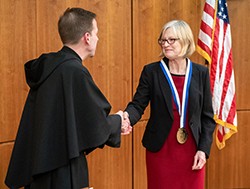
That the contributions of Celia Deane-Drummond, PhD, to the Catholic intellectual tradition are exceptional is due in no small part to her holding doctorates in two distinct fields: plant physiology and theology. She draws on this wealth of knowledge and wisdom in her current roles as the inaugural director of the Laudato Si’ Research Institute and a senior research fellow in Theology at Campion Hall, University of Oxford. She is also a visiting professor of Theology and Science at Durham University and was Professor of Theology at the University of Notre Dame 2011–19.
Deane-Drummond’s research focuses on the interface between theology—particularly systematic and moral theology—and science, including ecology, anthropology, evolution, animal studies, psychology and genetics. Issues related to bioethics, environmental ethics, genetics, animal ethics, global development and transhumanism especially fascinate her.
The marriage of science and theology in her academic pursuits occurred in the lab. While Deane-Drummond was doing experiments on plants, she also reflected on spiritual writings. The more she grew in her understanding of science, the more she was attracted to theological and ethical concepts.
Deane-Drummond has shared her gifts on the global stage for decades. She was instrumental in the foundation of and then chair of the European Forum for the Study of Religion and the Environment from 2011 to 2018 and is on the executive committee and a trustee of the International Society for Science and Religion, to name but a few of her services. She also is an inaugural co-editor of the international journal Philosophy, Theology and the Sciences. She serves on the editorial board for the Journal of Catholic Social Thought, published by Villanova University.
A prolific author, Deane-Drummond has written, edited and contributed to many publications. Recent titles include Shadow Sophia: The Evolution of Wisdom Volume II (Oxford University Press, 2021); Theology and Evolutionary Anthropology: Dialogues in Wisdom, Humility, and Grace (Routledge, 2020); Theological Ethics through a Multispecies Lens: The Evolution of Wisdom, Volume 1 (Oxford University Press, 2019); Theology and Ecology across the Disciplines: On Care for Our Common Home (T & T Clark, 2018); The Evolution of Human Wisdom (Lexington Books, 2017); Religion in the Anthropocene (Wipf & Stock, 2017); Ecology in Jürgen Moltmann’s Theology (Wipf & Stock, 2016); Technofutures, Nature and the Sacred: Transdisciplinary Perspectives (Ashgate, 2015); Christian Faith and the Earth: Current Paths and Emerging Horizons in Ecotheology (Bloomsbury T & T Clark, 2014); and The Wisdom of the Liminal: Evolution and Other Animals in Human Becoming (Eerdmans, 2014).
With her ability to blend secular and theological thought and imagine possibilities for a better world, Deane-Drummond personifies the ideal citizen envisioned in the Augustinian masterpiece that lends its name to this medal.
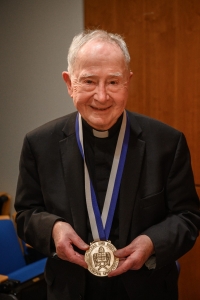
John W. O’Malley, SJ, PhD, is one of the most important scholars in the field of Church history. A University Professor in the Department of Theology at Georgetown, Father O’Malley has made unique and outstanding contributions to the intellectual life of the Catholic and global scholarly communities. He deserves the Civitas Dei Medal for many reasons, three in particular.
First, O’Malley, who earned his doctorate at Harvard, has committed more than 60 years to groundbreaking scholarship. For example, his 1993 book, The First Jesuits, marked a new beginning in the tradition of studies on the Society of Jesus. It has been translated into 12 languages.
Second, O’Malley rediscovered and gave new light to a theological tradition rooted in the Church councils held between the 16th and 20th centuries. His 2008 book, What Happened at Vatican II, reopened the debate on the Second Vatican Council in an unparalleled way during a difficult time—for both academia and the Church—in the field of conciliar studies. That publication launched a highly successful trilogy for Harvard University Press: Father O’Malley’s book on the Council of Trent followed in 2013 and, in 2018, his volume on Vatican I.
Finally, this Jesuit priest embodies the vocation of a scholar who contributes to academia, the Church and the public square as a teacher, thinker and writer able to crisscross different audiences, fields, times and places. He moves between the Renaissance and late modernity, America and Rome, theology and history, academic scholarship and ecclesial commitment. His focus is always on helping the Church better understand key moments in the Catholic tradition.
For these and other reasons, Father John O’Malley is a fitting recipient of this award. He personifies the ideal citizen in the Augustine masterpiece that lends its name to the medal.
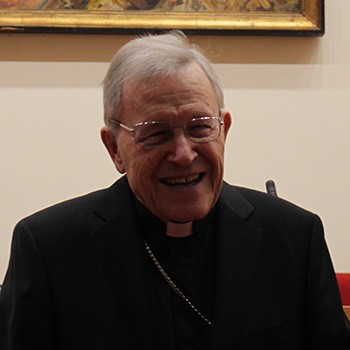
“Mercy is the fulfillment of justice.”
—Cardinal Walter Kasper, Mercy: The Essence of the Gospel and the Key to Christian Life
Cardinal Walter Kasper is a German theologian, bishop and president emeritus of the Pontifical Council for Promoting Christian Unity. Cardinal Kasper has dedicated more than 60 years of ordained ministry to relating the Gospel message to the joys and sufferings of contemporary society. He has advanced the Catholic Church’s ecumenical engagement; fostered its interreligious dialogue; and elucidated theology’s role in helping the faithful to understand the reason for their hope.
After completing his studies, Kasper became a professor of Dogmatic Theology at the University of Münster in 1964 and, in 1970, at Tübingen. As pastoral as he was brilliant, Kasper was ordained a bishop in 1989. For the next decade, he worked in the Diocese of Rottenburg-Stuttgart to heed the Church’s call for a new evangelization.
Respecting religious pluralism without compromising Catholic doctrine, Kasper strengthened relationships and increased dialogue with Orthodox, Protestant and Jewish leaders, especially during his Vatican years, 1999–2010. As co-chair of the International Commission for Lutheran-Catholic Dialogue, for example, Kasper signed the landmark “Joint Agreement on the Doctrine of Justification” in Augsburg.
Kasper has always embraced Anselm’s quest of “faith seeking understanding.” His more than 950 publications on topics such as the Triune God, human freedom, ecumenism and marriage reveal his theological clarity and commitment to the Church’s flourishing. His many translated books, including Jesus the Christ (1974) and Mercy (2014), have inspired and challenged scholars and other serious readers.
Kasper, who was elevated to cardinal in 2001, has emphasized the Church’s living teaching, whose wellspring is the Gospel. Speaking to the College of Cardinals before the 2014–15 Synod of Bishops on the Family, Kasper drew upon this tradition to suggest how the Church might pastorally approach challenges faced by divorced, civilly remarried persons.
Although he retired from his ecclesiastical offices in 2010, Kasper continues to find ways to proclaim the “unshakable hope of paschal victory.”
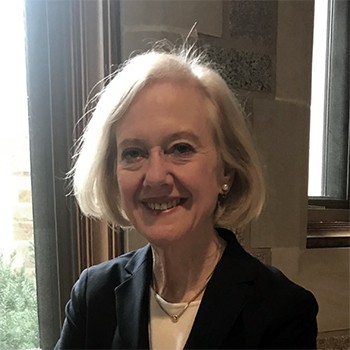
Lisa Sowle Cahill, PhD, is the J. Donald Monan, SJ, Professor at Boston College.
Dr. Cahill is a past president of the Catholic Theological Society of American (1992-93) and the Society of Christian Ethics (1997-98), and is a fellow of the American Academy of Arts and Sciences. Her works include Global Justice, Christology and Christian Ethics (Cambridge University Press, 2013); Theological Bioethics: Justice, Participation, and Change (Georgetown University Press, 2005); Bioethics and the Common Good (Marquette University Press, 2004); Family: A Christian Social Perspective (Fortress, 2000); Sex, Gender, and Christian Ethics (Cambridge University Press, 1996); A Theology and Praxis of Gender Equality (Bangalore: Dharmaram Publications, in press); and Love Your Enemies: Discipleship, Pacifism, and Just War Theory (1994; revised edition to appear in 2018). She is the editor of Genetics, Theology, Ethics: An Interdisciplinary Conversation (Crossroad, 2005); Sexuality and the US Catholic Church: Crisis and Renewal (Herder and Herder, 2006), and other works. Dr. Cahill received her MA and PhD degrees from the University of Chicago Divinity School.
Professor Cahill has written over two hundred articles and book chapters on theological ethics, Christology and ethics, the ethics of sex and gender, bioethics, the ethics of war and peacemaking, the common good and globalization, and Catholic social teaching. She has served on many editorial boards including the Journal of Catholic Social Thought.
She is the recipient of eleven Honorary Degrees. The University of Santa Clara, the Jesuit School of Theology, Berkeley, Catholic Theological Union, Chicago, and LaSalle University are some of the institutions honoring Professor Cahill. She is the recipient of many awards including: Alumna of the Year 1999, University of Chicago Divinity School, Ignatian Award, 2001 and the John Courtney Murray Award of the Catholic Theological Society of American, 2008.
She is a significant and profound contributor to the Catholic intellectual tradition, for which we owe a debt of gratitude.
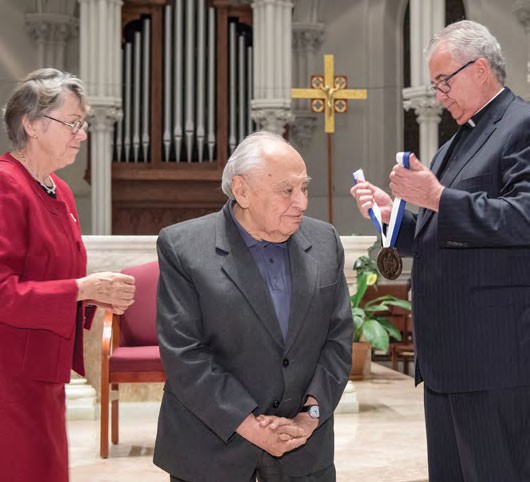
Gustavo Gutiérrez, OP, is the John Cardinal O'Hara Endowed Professor of Theology at the University of Notre Dame.
Fr. Gutiérrez was born in Lima, Peru in 1928. After studies in medicine and literature in Peru, Gustavo Gutierrez studied psychology and philosophy at Louvain, and eventually took a doctorate at the Institut Catholique in Lyons. He is most well-known for his foundational work in Latin American liberation theology,A Theology of Liberation: History, Politics, Salvation, which centers on the roles of the poor in the task of evangelization and the proclamation of the reign of God.
His other major works - which have been translated from Spanish into multiple languages besides English - touch as well on issues of spirituality and Latin American history, and include, We Drink From Our Own Wells: The Spiritual Journey of A People; On Job: God-Talk and the Suffering of the Innocent; The Truth Shall Make You Free; The God of Life, and Las Casas: In Search of the Poor of Jesus Christ.
His essays have appeared in Theological Studies, La Revista Latinoamericana de Teología, and Páginas. He has also published in and been a member of the board of directors of the international journal, Concilium.
He has been a principal professor at the Pontifical University of Peru, and has been visiting professor at many major universities in North America and Europe. He is a member of the Peruvian Academy of Language, and in 1993 he was awarded the Legion of Honor by the French government for his tireless work for human dignity and life, and against oppression, in Latin America and the Third World.
Perhaps more than any other contemporary theologian, Gustavo Gutiérrez is responsible for articulating the concept of the preferential option for the poor, which has gradually become a central tenant of the Church’s social teaching. He is currently at work on a book exploring the historical background and continuing theological relevance of this foundational principle.
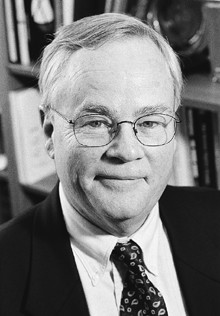
David Hollenbach, SJ, holds the University Chair in Human Rights and International Justice and is Director of the Center for Human Rights and International Justice at Boston College, where he teaches Christian social ethics in the Theology Department. He also teaches often at Hekima College of The Catholic University of Eastern Africa, Nairobi, Kenya, and has been visiting professor at the Jesuit Philosophy Institute in Ho Chi Minh City, Vietnam, and the East Asian Pastoral Institute in Manila, Philippines. He serves as a consultant to the Jesuit Refugee Service concerning advocacy on behalf of the human rights of displaced persons. He is on the editorial boards of the Journal of Catholic Social Thought and the Journal of Religious Ethics, Political Theology.
His scholarly career spans more than 50 years of teaching that includes ten books, more than a hundred and thirty articles and chapters in books. His research interests are in the foundations of Christian social ethics, especially human rights in the context of humanitarian crises and the displacement of refugees, theories of justice and the common good, and religion in political life. He is an untiring scholar and advocate for the common good.
Fr. Hollenbach is President-elect of the Catholic Theological Society (CTSA) and will serve as President of CTSA in 2016. Hollenbach served as President of the Society of Christian Ethics (1995-1996) and on the Board of Directors of the Catholic Theological Society (1982-1984). He assisted the National Conference of Catholic Bishops in drafting their 1986 pastoral letter Economic Justice for All: Catholic Social Teaching and the U.S. Economy. In 1979 he received a Walsh-Price Fellowship for travel in Israel, Lebanon, Syria, Jordan and Egypt to do research on religion and human rights in the Middle East. In 1996, he received a Fulbright Fellowship for research and teaching in Kenya. In June 1998, Hollenbach received the John Courtney Murray Award for outstanding contributions to theology from the Catholic Theological Society of America. In January 2009 he received the Marianist Award, given by the University of Dayton, as well as four honorary Doctorates for his contributions to the Catholic intellectual tradition. He is a scholar and activist for the cause of human rights throughout the world.
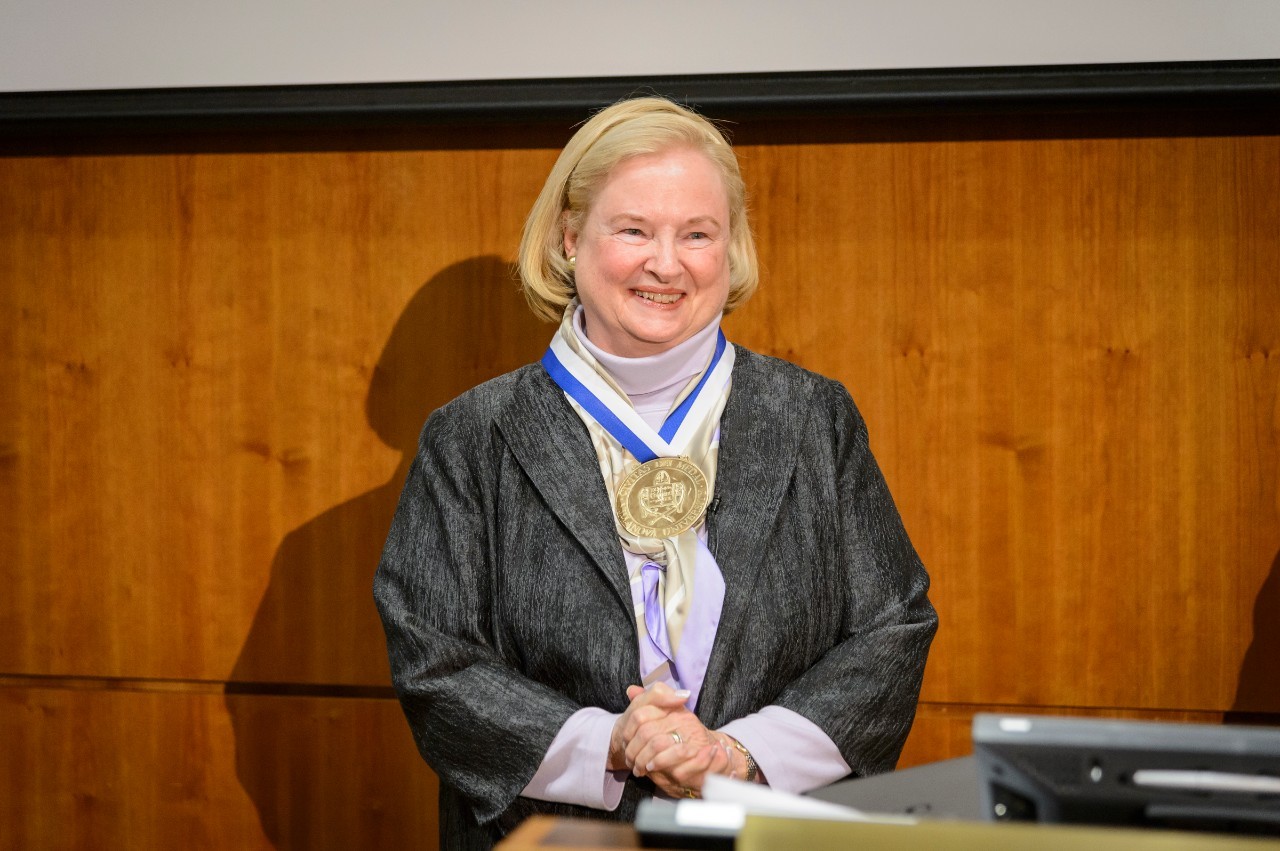
Mary Ann Glendon is the Learned Hand Professor of Law at Harvard University and former President of the Pontifical Academy of Social Sciences. She is a former U.S. Ambassador to the Holy See, and currently serves as Vice-Chair of the U.S. Commission on International Religious Freedom. She writes and teaches in the fields of human rights, comparative law, constitutional law, and political theory.
Glendon is a member of the American Academy of Arts and Sciences, the International Academy of Comparative Law, and a past president of the UNESCO-sponsored International Association of Legal Science. She served two terms as a member of the U.S. President's Council on Bioethics (2001-2004), and has represented the Holy See at various conferences including the 1995 U.N. World Conference on Women in Beijing, where she headed the Vatican delegation.
Glendon has contributed to legal and social thought in several widely translated works, bringing a comparative approach to a variety of subjects. Among her publications are 16 books and over 140 articles. They include The Forum and the Tower (2011), a series of biographical essays exploring the relation between political philosophy and politics-in-action; Traditions in Turmoil (2006), a collection of essays on law, culture and human rights; A World Made New: Eleanor Roosevelt and the Universal Declaration of Human Rights (2001), which the New York Times reviewer said should be the definitive study of the framing of the UDHR; A Nation Under Lawyers (1996), a portrait of turbulence in the legal profession, analyzing the implications of changes in legal culture for a democratic polity that entrusts crucial roles to legally trained men and women;Rights Talk (1991), a critique of the impoverishment of political discourse; The Transformation of Family Law (1989), winner of the legal academy’s highest honor, the Order of the Coif Book Award; Abortion and Divorce in Western Law (1987), winner of the Scribes Book Award for best writing on a legal subject; The New Family and the New Property (1981), and textbooks on comparative legal traditions.
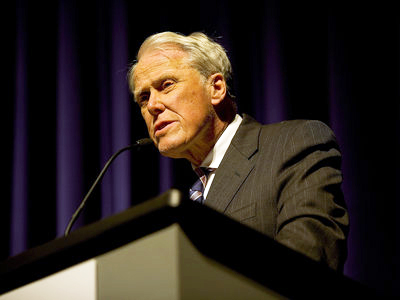
John T. Noonan is a husband and father, scholar, author, teacher, distinguished jurist and faithful son of the Church. Currently, he is Robbins Professor of Law, Emeritus at the University of California, Berkeley.
In a scholarly and professional career that now spans 65 years, he has written a number of important studies about the interaction of Catholic moral doctrine and the law. He has authored a series of biographical essays on leading canon lawyers of the twelfth century as well as articles on scholastic philosophy. Many focus on morality and ethics, American and world Catholicism, and the development of moral doctrine. These writings have shaped Catholic debate in the United States for over four decades. Among his most influential works are Contraception: A History of Its Treatment by the Catholic Theologians and Canonists (1968) and A Church That Can And Cannot Change: The Development of Catholic Moral Teaching (2005).
As a Harvard-trained lawyer and a federal judge, Noonan has helped decide a number of important cases, most notably ones addressing the death penalty and assisted suicide. He has also authored a number of books, papers, essays and articles of general interest to the American legal profession. Among the most notable of these works are The Lustre of Our Country: The American Experience of Religious Freedom (1998) and Narrowing the Nation's Power: The Supreme Court Sides with the States (2002).
In addition, he has served the country as a member of the Presidential Commission on Population, National Institutes of Health, National Endowment for the Humanities, Ford and Rockefeller Foundations, as well as the American Law Institute. Likewise, he has served the Church as a consultant to the USCCB committees on moral values, law and public policy, law and life issues, as well as the committee on social development and world peace. He has been awarded eight honorary degrees, University of Notre Dame's Laetare medal in 1984, and the Aquinas medal from the American Catholic Philosophical Association in 1995.
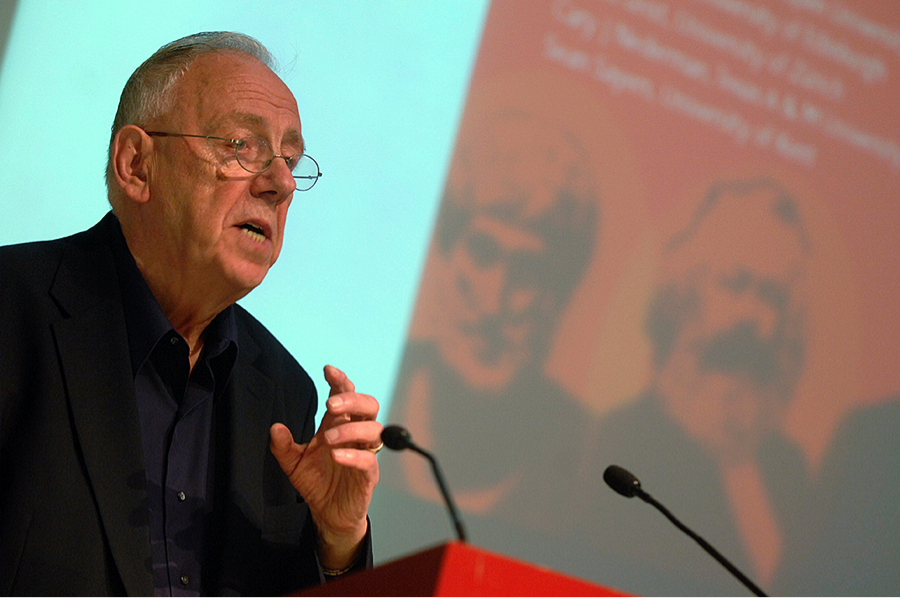
Alasdair MacIntyre is the Rev. John A. O’Brien Senior Research Professor of Philosophy (emeritus) at the University of Notre Dame. In a career spanning six decades, he has published over 30 books and hundreds of articles and reviews. Professor MacIntyre has made significant contributions to the history of philosophy, moral philosophy, political theory, the philosophy of the social sciences, and the philosophy of religion. His early works include Marxism: An Interpretation (1953), The Unconscious: A Conceptual Analysis (1958), A Short History of Ethics (1966), and Against the Self-Images of the Age (1971). The influential sequence of books, After Virtue (1981), Whose Justice? Which Rationality? (1988), Three Rival Versions of Moral Enquiry (1990), and Dependent Rational Animals (1999) constitute the most important contemporary articulation of Aristotelianism and a sustained critique of modern moral philosophy. More recently, he has published an examination of the philosophical work of Edith Stein set against the background of twentieth century phenomenology, Edith Stein: A Philosophical Prologue, 1913-1922 (2005), two volumes of his collected papers, The Tasks of Philosophy and Ethics and Politics (2006), and God, Philosophy, Universities: A Selective History of the Catholic Philosophical Tradition (2009).
Professor MacIntyre received his BA from Queen Mary College, University of London and MA degrees from Manchester and Oxford. Professor MacIntyre has held academic appointments at Oxford, Princeton, Brandeis, Wellesley, Boston University, Yale, Vanderbilt, and Duke. He has delivered the Gifford Lectures at the University of Edinburgh, the Carus Lectures at the American Philosophical Association, the Caryle Lectures at Oxford University, the Tanner Lectures and Gauss Lectures at Princeton University, and the Aquinas Lecture at Marquette University. Professor MacIntyre is a Fellow of the American Academy of Arts and Sciences, a Corresponding Fellow of the British Academy, a Member of the Royal Irish Academy, and a Member of the American Philosophical Society. In 2010, he was awarded the Aquinas Medal by the American Catholic Philosophical Association.
